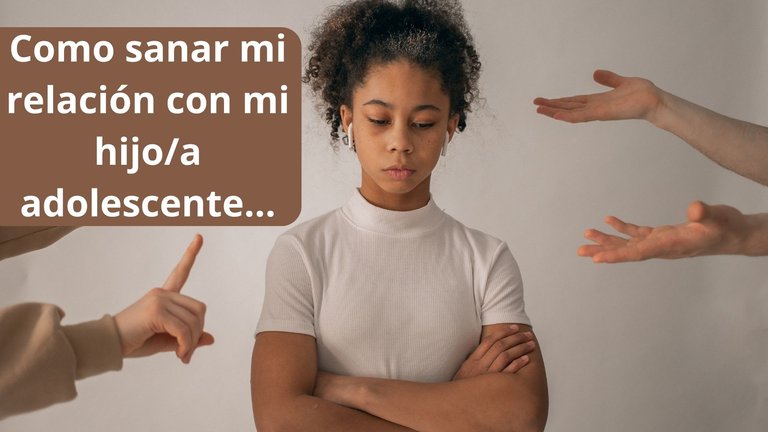
¿Tu hijo o hija adolescente pasó de ser un hijo/a agradable y obediente a estar mayormente mal humorado/a, agresivo/a, mal portado/a o triste?
Si la respuesta es sí, al finalizar de leer este post sabrás cuales pueden ser las causas de este cambio y sabrás como hacer que tu hijo/a logre superar esos estados emocionales.
¡Hola! Este post lo escribo con muchísimo cariño y con la intención de dar a conocer una valiosa herramienta a los padres y madres que se hallen sin saber qué hacer con las actitudes de sus hijo/as adolescentes.
Lo primero es que quiero que conozcan un poco del poder de aplicar estas herramientas, y para ello les comentaré un caso reciente en el que una de mis coachees (persona que recibe coaching), madre de 3 hijos varones, uno de ellos de 12 años de edad, logró entender la actitud rebelde que venia presentando su hijo y como logró ayudarlo a superar esta "rebeldía sin causa" (muy entre comillas).
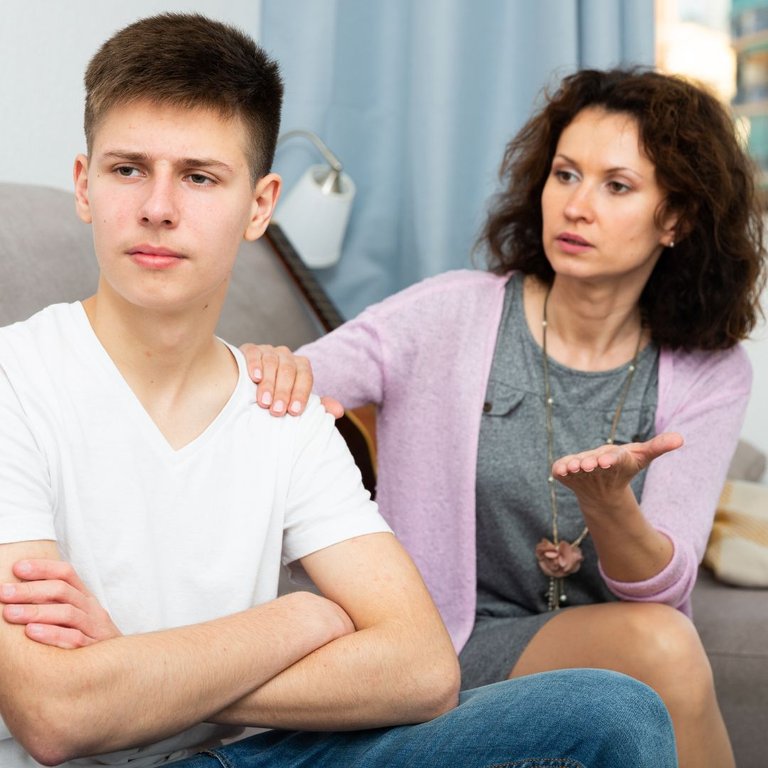
Por motivo de privacidad cambiaré sus nombres; María (la madre) y Carlos (el hijo adolescente).
María me cuenta que su hijo Carlos de 12 años, ha tenido un cambio de actitud un tanto brusco. Antes era un niño que ella describió como "un sol"; era cariñoso, afectuoso, la abrazaba, le decía que la amaba, etc. Desde hace aproximadamente 3 meses, Carlos venia presentando una constante actitud mal humorada.
Ella me cuenta que la mayor parte del tiempo, tenia una cara de molesto y estaba un poco verbalmente agresivo. Cuando enfrentaba situaciones desafiantes, Carlos se frustraba con facilidad y se molestaba al grado de aislarse y querer estar solo o de ponerse a llorar.
Este comportamiento hasta la maestra de Carlos en la escuela lo había notado y lo había comentado con María. Ninguna sabia qué le estaba pasando y porque ese cambio. Entre ideas solo supusieron que se trataba de algo hormonal, el desarrollo y ese tipo de cosas que como no las entendemos o sabemos muy poco acerca de eso, pues, quizás sea eso, supusieron ambas.
María, quien aplicando muchas de las herramientas que le he compartido en sesiones anteriores, ha creado un vinculo estrecho con sus 3 hijos y un canal de comunicación libre de juicios y lleno de comprensión y empatía. Así que como primer recurso le preguntó a su hijo, en privado y tranquilamente, que qué le estaba pasando, que él sabia que le podía contar a su mamá cualquier cosa que lo estuviese molestando y podía confiar en ella.
Carlos solo respondía: "Nada, no me pasa nada" y mantenía una postura de brazos cruzados, mirada hacia abajo y esquiva.
Ella me dijo: "Yo estoy clara que muchas veces fui dura con él, pero ya eso pasó.. Él no tiene porque ponerse así, el sabe que puede decirme lo que sea que lo esté molestando."
Ahora, quiero que adviertan estas palabras de María, ya que son MUY pero MUY comunes y son TERRIBLEMENTE perjudiciales. Son comunes pero no son normales.
Lo primero que le dije a María fue: "María, recuerda que la ira o la rabia vienen del dolor, es decir, primero sentimos dolor y luego pasamos a la rabia/ira/odio, etc. Si el niño ahora te esta mostrando una actitud de rabia o que se pone a llorar cuando se frustra, ya podemos ver que hay un dolor, una herida emocional que el no ha sabido cómo gestionar y no ha habido nadie que lo guíe en ese sentido..."
Mientras María solo prestaba atención en silencio total, continué: "Entonces, por lo que me comentas de que en la infancia muchas veces le pegaste de manera injusta, es muy probable que Carlos ahora esté sintiendo el dolor de ese evento y OJO!!" le exclamé: "No me refiero al dolor de los golpes, me refiero al dolor de la injusticia y la impotencia."
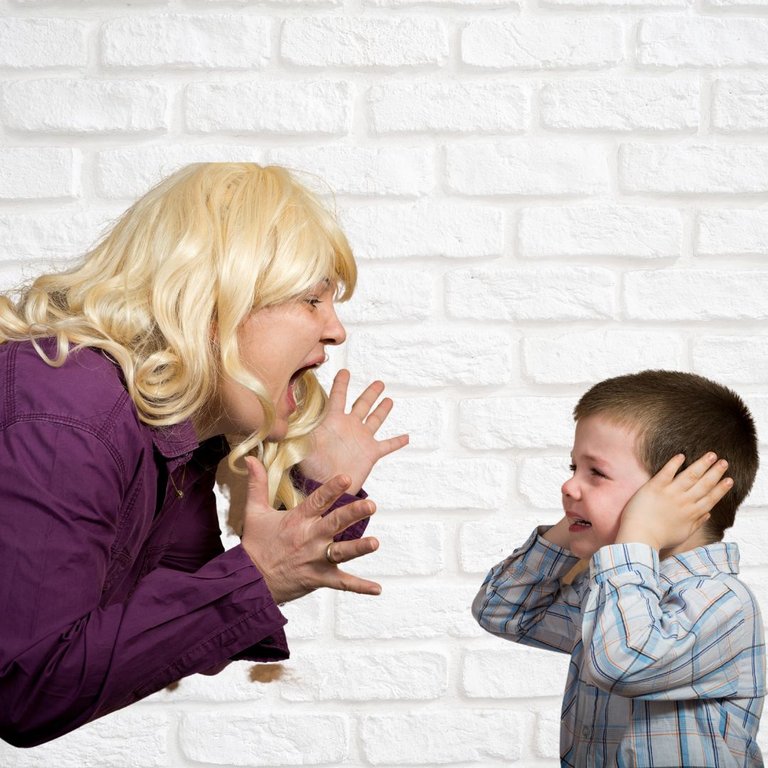
Para darle una perspectiva más clara a María, le puse el siguiente ejemplo: "Mira, tu eres su madre. Eres la persona más importante para él, la más valiosa.. Cuando tu le pegas a tu hijo/a que esta en la etapa de la infancia (hasta los 12 o 14 años de edad), ellos no ven como "fue injusto" sino que lo ven como: "Mi mamá me pegó por mi culpa.. Porque YO me porté mal. Yo estoy mal."...
Y así piensan siempre cuando nosotros los desaprobamos o regañamos durante su infancia. Entre los 12 y 14 años de edad, que inicia la adolescencia, nuestra perspectiva empieza a cambiar. Ya sabemos lo que es bueno y lo que no, según nuestra crianza y cultura. Ya entonces, Carlos se va dando cuenta que cuando le pegaste de niño, no era que él estaba mal, fue que tu te equivocaste, no le preguntaste, no le explicaste, no escuchaste su versión, etc. Simplemente lo hiciste o simplemente fuiste como fuiste con él... Eso solo en ese evento, que de seguro hubo muchos eventos parecidos a ese...
El tema es que durante todo ese tiempo, él se estuvo culpando por todo lo que él pensó que hizo mal, y ahora que se da cuenta que la culpa no fue de él, sino que esa no era la manera más amorosa o asertiva o incluso educada de tu proceder hacía él, entonces su manera de ver el pasado cambia. Y como cambia lo que piensa, también cambia lo que siente.
Recuerda, en la etapa de la adolescencia es cuando el ser humano empieza a "adolecerse" de lo que sucedió (y algunas veces de lo que no sucedió) en la infancia.
Entonces, si realmente quieres que tu hijo logre superar ese mal humor e irritabilidad que tiene, que proviene de sus heridas emocionales no gestionadas correctamente, tienes que decirme si estás dispuesta a aplicar la herramienta que te voy a compartir..."
María siempre ha sido una de mi coachees con más voluntad en comparación a otras personas que han asistido a mis sesiones de coaching. Impulsada por el amor a su hijo, a su familia y las ganas de saber cuál era la fulana herramienta que le iba a compartir, me respondió: "Si, Javi.. Si estoy dispuesta."
La miré fijamente y le dije: "De acuerdo..." Respiré y le dije: "La herramienta consta de 3 pasos; El primero no es el más fácil pero si el más sencillo y el más poderoso y eficiente. Además, es algo que normalmente hace una persona sensata, educada y de corazón humilde y es: "Reconocer que hiciste un daño o que hiciste algo mal y pedir disculpas o pedir perdón..."
Guardé silencio por un momento y así dejar que María analizara lo que recién acababa de escuchar...
Continué: "Recuerda, esto es lo que hace una persona sensata, educada y de corazón humilde.. Para uno reconocer que hizo algo mal y lastimó a una persona y de paso pedir disculpas por eso, hay que tener KILOS de humildad en el corazón y KILOS de voluntad, pues, esto es algo que las personas orgullosas y soberbias bajo ninguna circunstancia quieren hacer y por eso caminan solos, aunque estén acompañados y jamás entienden nada, solo lo que ellos mismos se dicen a si mismos...
Por eso te dije que no es el paso más fácil, pero si el más sencillo. Tómalo o déjalo, es tu libre elección..."
Ella quedó en silencio reflexionando y luego de a penas unos segundos me dijo: "Es verdad.. Tienes razón."
Asenté y continué: "Luego de pedirle disculpas por lo que sea que hayas hecho que lo haya lastimado, sabiendo tu o sin tu saberlo, el 2 paso es Comprometerte a NO VOLVERLO hacer. Comprometerte con ser una mejor persona, recuerda el dicho que reza: "Una verdadera disculpa, es un cambio de actitud."...
Y como 3er y último paso, ábrele la puerta a tu hijo a que te deje saber cuando te estás equivocando. Pídele que de manera educada, tal como tu lo harías, te deje saber cuando le estas diciendo o haciendo algo que lo está lastimando o lo está haciendo sentirse mal.
De esa manera, la comunicación entre ustedes será mejor y tu podrás saber cuando estas rompiendo el compromiso que realizaste en el paso 2."
María solo bajó su cabeza y se puso a reflexionar en todos los momentos que se equivocó y en todos los momentos de cuando era niña, sus padres la hicieron sentir mal por diferentes causas. Ahora ella entendía el porque sentía rencor y tenía algunos reproches hacia ellos.
Muchas personas no quieren que sus hijos sientan lo que ellos mismos sienten o sintieron por sus padres.. No quieren que la "historia se repita" y pasar ellos de ser las victimas a ahora ser los "victimarios" o "villanos". Ella supo que lo puede hacer diferente.
Luego de eso terminamos nuestra sesión, ella se fue y luego de una semana volvería a mi sesión para contarme los resultados, que aunque ya me los imaginaba, también me sorprendieron un poco...
Resultado
Luego de 1 semana María vuelve a la sesión y me comenta que habló con su hijo, tranquilamente y en privado. Me comenta que Carlos empezó a llorar cuando escuchó las disculpas de su madre. En ningún momento dijo nada, solo lloró y se abrazaron. Al finalizar la charla, ella le recordó que podía contar con ella y le podía comunicar cualquier cosa que él quisiera.
María me comenta que el niño tuvo un cambio de actitud luego de esa conversación. Empezó a estar más tranquilo, obediente y cariñoso con ella y cada vez que ella iba a salir, Carlos se acercaba a ella decirle que quería ir con ella para ayudarla. Un dato curioso aquí, es que también cambió de actitud con su maestra. Esto debe, a que ella también es una figura femenina de autoridad en el subconsciente de Carlos, al cambiar el vinculo materno (sanarse), también hay cambios hacía todas las personas que representen una figura femenina de autoridad e importancia, como lo son: maestras, jefas y novia en el caso de los varones.
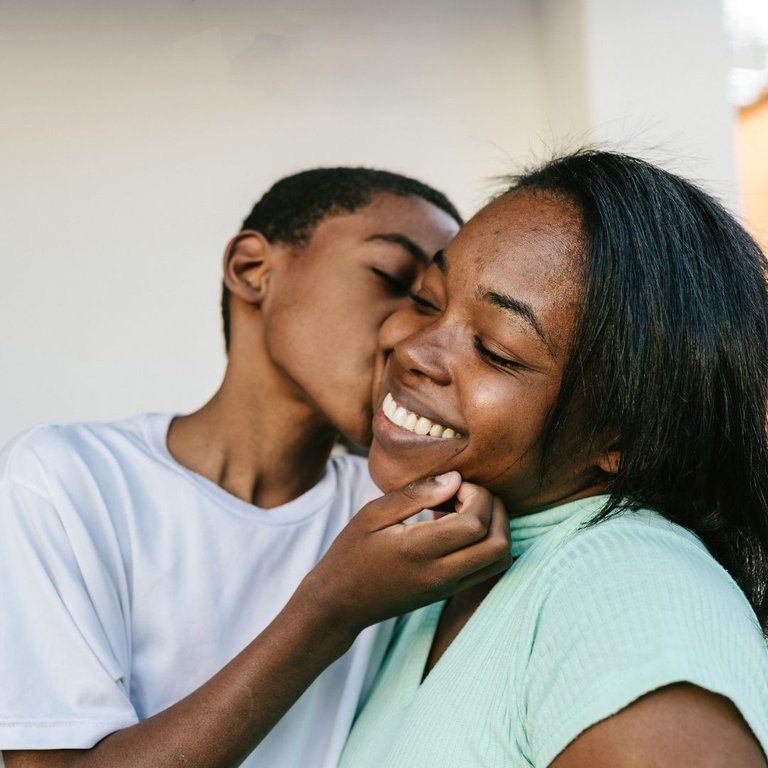
Algo que me comentó María, es que aunque Carlos había cambiado de actitud con ella y su maestra, Carlos mantenía la misma posición hacia su papá, es decir, seguía siendo un poco rebelde cuando se trataba de interactuar con el papá, agregó que el cambio que ella había notado, es que el Carlos quería pasar más tiempo con su papá, pero seguía siendo un poco rebelde ante su padre.
Le dije que muy posiblemente se trataba que Carlos estaba esperando que su papá también le ofreciera una disculpa y le mostrara con este gesto, lo valioso que es Carlos para él y ya eso, escapa de las manos de María...
Ella me dijo que habló con su esposo, pero él no estuvo muy receptivo. No dijo que no, pero solo guardó silencio ante la idea de reconocer sus errores, ya ustedes saben, cosas del machismo.
Mi única recomendación fue decirle a María que le comentara todo lo que ella ya sabia a su esposo, que le explicara sin intención de que él lo haga, lo importante es que el sepa y ya. Él ya verá que hace con eso ahora sabe.
Fin de los resultados
Tres pasos simples y poderosos;
- Asumir y pedir disculpas
- Comprometerse a cambiar (una verdadera disculpa es un cambio de actitud).
- Permitir que te digan cuando lo estás haciendo mal.
Tres pasos que cambian para siempre la vida un hijo/a...
Quiero despedir este post con una frase que siempre me ha gustado y me ha acompañado a lo largo de este camino de constante crecimiento personal y que hoy, se las comento a ustedes; "Ahora, lo sabes..."
Gracias por leer.
English
Did your teenage son or daughter go from being a pleasant and obedient child to being mostly moody, aggressive, misbehaved or sad?
If the answer is yes, by the end of reading this post you will know what may be the causes of this change and you will know how to make your child overcome these emotional states.
Hello! I am writing this post with great affection and with the intention of providing a valuable tool for parents who do not know what to do with the attitudes of their adolescent children.
First of all, I want you to know a little of the power of applying these tools, and for this I will tell you about a recent case in which one of my coachees (person receiving coaching), mother of 3 sons, one of them 12 years old, managed to understand the rebellious attitude that her son had been presenting and how she managed to help him overcome this "rebellion without cause" (very much in quotation marks).

For privacy reasons I will change their names; Maria (the mother) and Carlos (the adolescent son).
Maria tells me that her 12-year-old son Carlos has had a somewhat abrupt change of attitude. He used to be a child that she described as "a sunshine"; he was affectionate, affectionate, hugged her, told her he loved her, etc. For the last 3 months or so, Carlos has been presenting a constant bad-tempered attitude.
She tells me that most of the time, he had an annoyed look on his face and was a bit verbally aggressive. When faced with challenging situations, Carlos would become easily frustrated and upset to the point of isolating himself and wanting to be alone or crying.
Even Carlos' teacher at school had noticed this behavior and discussed it with Maria. None of them knew what was happening to him and why this change. Between ideas they just assumed that it was something hormonal, developmental and that kind of thing that as we do not understand or know very little about it, well, maybe that's it, they both assumed.
Maria, who by applying many of the tools I have shared with her in previous sessions, has created a close bond with her 3 children and a communication channel free of judgments and full of understanding and empathy. So as a first resource she asked her son, privately and calmly, what was going on with him, that he knew he could tell his mom anything that was bothering him and he could trust her.
Carlos only answered: "Nothing, nothing is wrong with me" and kept his arms folded, looking down and dodging.
She told me: "I am clear that many times I was hard on him, but that's over now. He doesn't have to be like that, he knows he can tell me whatever is bothering him."
Now, I want you to notice these words from Maria, as they are VERY, VERY common and they are TERRIBLY harmful. They are common but they are not normal.
The first thing I said to Maria was, "Maria, remember that anger or rage comes from pain, i.e., first we feel pain and then we move on to anger/rage/hate, etc. If the child is now showing you an attitude of anger or that he starts crying when he gets frustrated, we can already see that there is a pain, an emotional wound that he has not known how to manage and there has been no one to guide him in that sense..."
While Maria only paid attention in total silence, I continued, "Then, because of what you tell me about how in childhood you often hit him unfairly, it is very likely that Carlos is now feeling the pain of that event and EYE!!!" I exclaimed, "I am not referring to the pain of the blows, I am referring to the pain of injustice and helplessness."

To give Mary a clearer perspective, I gave her the following example, "Look, you are his mother. You are the most important person to him, the most valuable.... When you hit your child who is in the infancy stage (up to 12 or 14 years of age), they don't see it as 'it was unfair' but they see it as: 'My mom hit me because of me.... Because I was bad. I am bad..."...
And that's how they always think when we disapprove or scold them during their childhood. Between the ages of 12 and 14, when adolescence begins, our perspective begins to change. We already know what is good and what is not, according to our upbringing and culture. Even then, Carlos realizes that when you hit him as a child, it wasn't that he was wrong, it was that you were wrong, you didn't ask him, you didn't explain, you didn't listen to his version, etc. You just did it or just went as you went with him.... That's just in that event, there sure were many events similar to that one....
The thing is that during all that time, he was blaming himself for everything he thought he did wrong, and now that he realizes that it was not his fault, but that it was not the most loving or assertive or even polite way you did towards him, then his way of looking at the past changes. And as what he thinks changes, so does what he feels.
Remember, adolescence is when human beings begin to "suffer" from what happened (and sometimes what did not happen) in childhood.
So, if you really want your child to overcome that bad mood and irritability he/she has, which comes from his/her emotional wounds not properly managed, you have to tell me if you are willing to apply the tool I am going to share with you..."
Maria has always been one of my most willing coachees compared to others who have attended my coaching sessions. Driven by love for her son, her family and the desire to know what was the so-and-so tool I was going to share with her, she responded, "Yes, Javi.... Yes I am willing."
I stared at her and said, "Okay..." I took a breath and said, "The tool consists of 3 steps; The first one is not the easiest but it is the simplest and the most powerful and efficient. Besides, it is something that a sensible, educated and humble-hearted person normally does and that is: "Acknowledge that you did a wrong or that you did something wrong and apologize or ask for forgiveness..."
I kept silent for a moment and thus let Maria analyze what she had just heard....
I continued, "Remember, this is what a sensible, educated, and humble-hearted person does.... To recognize that you did something wrong and hurt a person and apologize for it, you have to have KILOS of humility in your heart and KILOS of will, well, this is something that proud and arrogant people under no circumstances want to do and that is why they walk alone, even if they are accompanied and never understand anything, only what they tell themselves....
That is why I told you that it is not the easiest step, but it is the simplest. Take it or leave it, it's your free choice..."
She was silent in reflection and after barely a few seconds she said to me, "It's true.... You're right."
I nodded and continued, "After apologizing to him for whatever you did that hurt him, whether you knew it or not, the second step is to COMMIT to NOT DO IT AGAIN. Commit yourself to be a better person, remember the saying: "A true apology is a change of attitude..."....
And as a 3rd and final step, open the door for your child to let you know when you are making a mistake. Ask him to politely, just as you would, let you know when you are saying or doing something that is hurting him or making him feel bad.
That way, communication between you will be better and you will be able to know when you are breaking the commitment you made in step 2."
Maria just put her head down and started to reflect on all the times she was wrong and all the times when she was a child, her parents made her feel bad for different causes. Now she understood why she felt resentful and had some reproaches towards them.
Many people don't want their children to feel what they themselves feel or felt about their parents. They don't want "history to repeat itself" and for them to go from being the victims to now being the "victimizers" or "villains". She knew she could do it differently.
After that we finished our session, she left and after a week she would come back to my session to tell me the results, which although I already imagined them, I was also a bit surprised....
Result .
After 1 week Maria returns to the session and tells me that she spoke with her son, quietly and privately. She tells me that Carlos started crying when he heard his mother's apology. At no time did he say anything, he just cried and they hugged. At the end of the talk, she reminded him that he could count on her and that he could tell her anything he wanted.
Maria tells me that the boy had a change of attitude after that conversation. He began to be calmer, more obedient and affectionate with her and every time she went out, Carlos would approach her and tell her that he wanted to go with her to help her. A curious fact here is that he also changed his attitude with his teacher. This is due to the fact that she is also a female authority figure in Carlos' subconscious, when the maternal bond changes (healing), there are also changes towards all the people who represent a female figure of authority and importance, such as: teachers, bosses (female) and girlfriends in the case of men.

Something that Maria told me was that although Carlos had changed his attitude towards her and his teacher, Carlos maintained the same position towards his father, that is, he was still a little rebellious when it came to interacting with his father, she added that the change she had noticed was that Carlos wanted to spend more time with his father, but he was still a little rebellious towards his father.
I told her that most likely it was that Carlos was waiting for his dad to also offer him an apology and show him with this gesture, how valuable Carlos is to him and already that is out of Maria's hands?
She told me that she talked to her husband, but he was not very receptive. He didn't say no, but he just kept silent at the idea of recognizing his mistakes, you know, machismo stuff.
My only recommendation was to tell Maria to tell her husband everything she already knew, to explain it to him without any intention of him doing it, the important thing is that he knows and that's it. He will see what he does with it now he knows.
End of results .
Three simple and powerful steps;
- Assume and apologize
- Commit to change (a true apology is a change in attitude).
- Allowing yourself to be told when you are doing it wrong.
Three steps that change a child's life forever...
I want to say goodbye to this post with a phrase that I have always liked and that has accompanied me along this path of constant personal growth and that today, I comment to you; "Now, you know..."
Thank you for reading. .
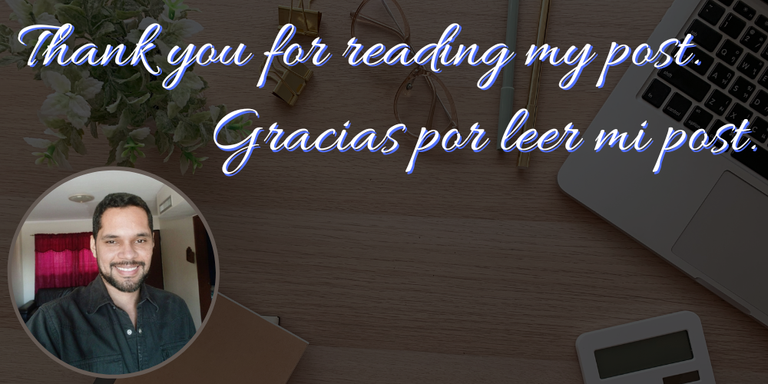
Congratulations @javi2050! You have completed the following achievement on the Hive blockchain And have been rewarded with New badge(s)
Your next target is to reach 50 comments.
You can view your badges on your board and compare yourself to others in the Ranking
If you no longer want to receive notifications, reply to this comment with the word
STOPTo support your work, I also upvoted your post!
Check out our last posts: